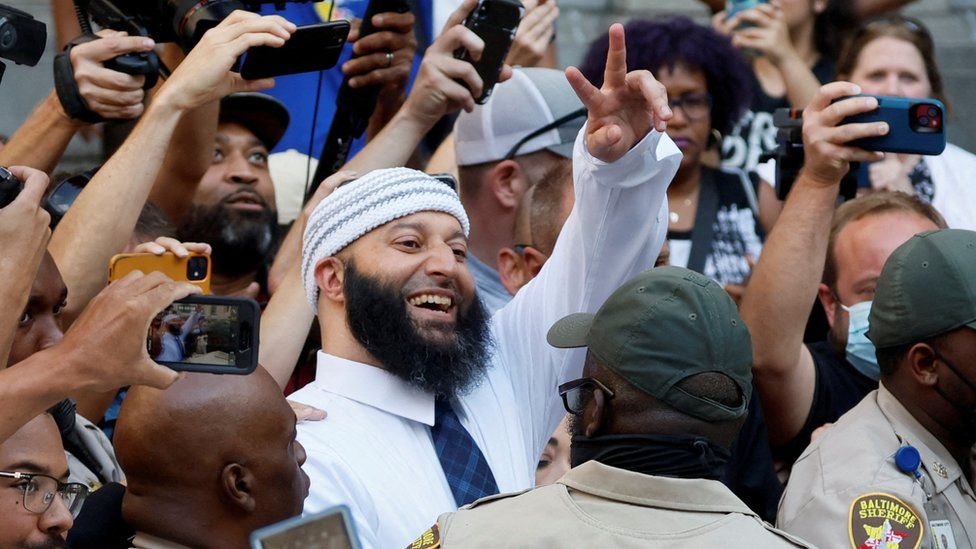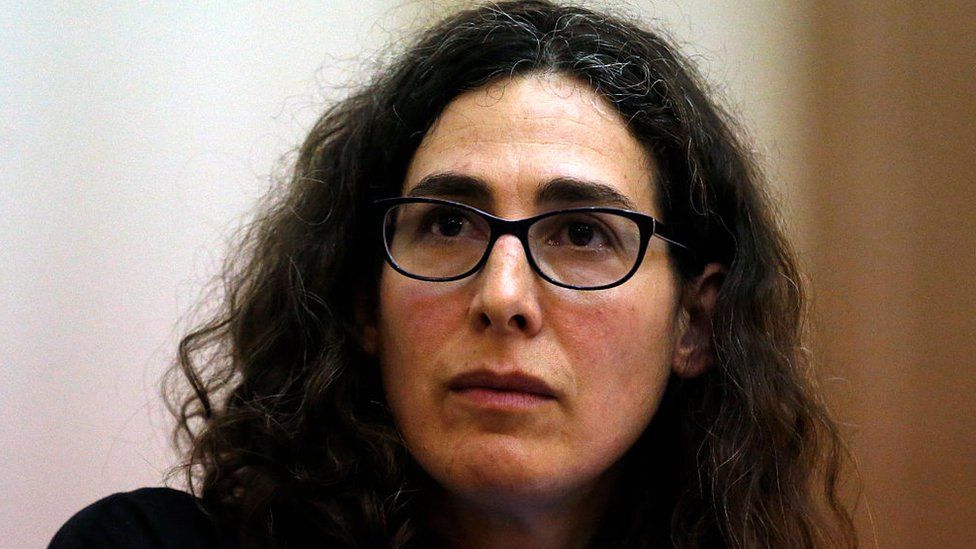By Chelsea Bailey
BBC News, Washington
-
Published
7 days ago
By Chelsea Bailey
BBC News, Washington
Published
7 days ago
 Image source, Reuters
Image source, ReutersAdnan Syed reacts after a court overturned his 2000 murder conviction
In 2000, Adnan Syed, a high school senior in Baltimore, Maryland, was convicted of strangling and killing his ex-girlfriend Hae Min Lee.
The case - in which the prosecution painted Syed as a violent and jealous ex-lover who brutally killed a bright and talented young woman - made national headlines.
On Monday, a Maryland judge overturned his conviction and set a deadline for a new trial.
For nearly 25 years Syed has maintained his innocence. His case won a massive boost from an unlikely source - a podcast.
More than a decade after Syed was sent to prison, Rabia Chaudry, a Baltimore-based lawyer and family friend of the Syeds, emailed a journalist named Sarah Koenig and asked her to re-investigate Lee's murder.
That email helped launch the first season of the podcast Serial. The show premiered in autumn 2014 and each episode tried to piece together a timeline of what happened the night Lee was killed.
That's the question at the heart of Serial.
"For the last year I've spent every working day trying to figure out where a high school kid was for an hour after school one day in 1999," Ms Koenig says in the first episode.
Only now, the "kids" she interviewed were adults and some of their stories had changed.
As each episode revealed new details - and potential new suspects - internet sleuths and armchair detectives sprang into action and argued their theories on social media.
Within months, the chatter around Syed's case would ultimately help him win a new trial.
In the latest episode of Serial, Koenig lays out why Adnan Syed's conviction was overturned. She says his lawyers argued new evidence had emerged showing that during the original trial prosecutors failed to investigate and rule out two potential suspects who were known to detectives at the time. Syed's lawyers also questioned the reliability of witness statements and cell phone evidence originally used to convict him.
A judge agreed and overturned Syed's conviction, but it does not mean he's been cleared of Lee's murder. Prosecutors now have to decide whether they will retry Adnan Syed or re-open Hae Min Lee's case and look for new suspects.

Image source, Getty Images
The Serial podcast is hosted by journalist Sarah Koenig
Serial helped ignite the popularity of podcasts. Ms Koenig's signature confessional style, as well as the true crime topic, kept listeners returning - and downloading - the show every week.
The first season of Serial has been downloaded more than 300 million times and the show is widely cited as one of the most popular podcasts in the world.
Though subsequent seasons of the show were less popular, in many ways, Ms Koenig and her team helped create the formula for a "bingeable" podcast.
In 2015, Syed was granted a new trial based, in part, on new evidence uncovered while making Serial.
But a judge also denied his request for bail. He remained imprisoned for years as his legal team argued for a new trial and tried to appeal his conviction all the way to the Supreme Court.
In 2019, HBO premiered a four-part documentary series produced by Ms Chaudry called The Case Against Adnan Syed.
The series argued that Syed, who is Muslim, was convicted, in part, because of racial bias.
It ultimately revealed that forensic analyses had found no trace of his DNA on Lee's body at the time of the murder.
The Lee family refused to participate in Serial, and has always maintained that they believe Syed was rightfully convicted and justice was served during the original trial.
In 2016, when Syed was granted a new trial, the family told reporters that the podcast had "reopened wounds few can imagine", according to the Baltimore Sun. They also said they believed people had been misinformed by the podcast and regretted that "so few [were] willing to speak up for Hae".
Before the judge ruled on Monday, Young Lee, the victim's brother, made an emotional plea before the court on behalf of the family.
"This is not a podcast for me. This is real life - a never-ending nightmare for 20-plus years."
With Syed's conviction overturned, prosecutors have the next 30 days to decide whether they will bring a new trial or drop the charges against him.
If Lee's murder investigation is reopened, new evidence could help exonerate Syed.
It may also give the grieving Lee family some much-needed closure at long last.
Prosecutors say they have identified two possible "alternate" suspects, neither of whom has yet been named or ever charged in the case.